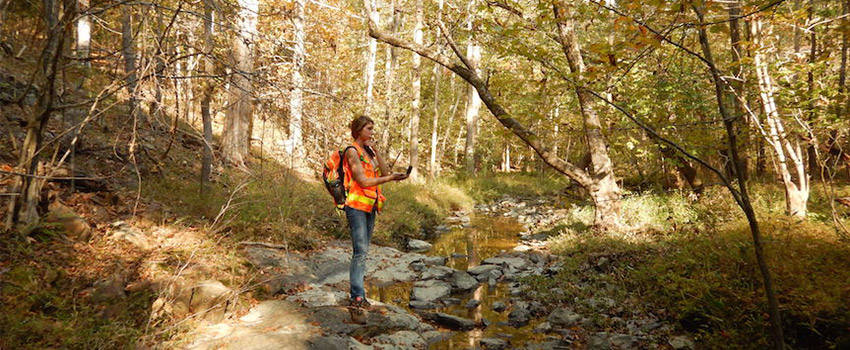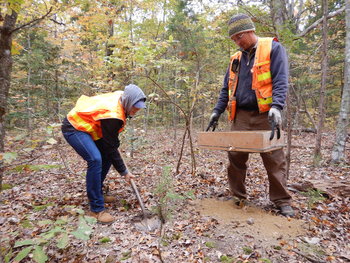

Picture an archaeologist, and you’ll likely conjure an image of Indiana Jones, complete with a wide-brimmed fedora, sweeping away dust from an Egyptian tomb.
It’s a popular misconception, but one that hardly applies to the tens of thousands of archaeologists in the world. Most professionals work in a field known as cultural resources management, a billion-dollar industry that often fulfills federal and state requirements for evaluating the historical significance of land before it is developed.
At Longwood University, students have a direct path to this kind of real-world experience through the university’s new Institute of Archaeology founded in September. Already Institute staff and students are hard at work on two projects, and arrangements have been finalized for another that will begin in January and continue in the summer.
[Related Video: About the Longwood Anthropology Program]

Working at the Mecklenburg site.
Currently under way are a shoreline study across four counties on Virginia’s coast and a survey of an antebellum plantation in Mecklenburg County for the National Trust for Historic Preservation. The shoreline study is a collaborative project with the Virginia Department of Historic Resources and is funded through the National Park Service. The setting for the new project is in the Caribbean, where the owner of a private island has engaged the Institute to determine the extent to which pre-Columbian natives occupied and used the island’s tropical forest and other resources more than 1,000 years ago.
"The unique thing about Longwood’s Institute is that we are drilling down to the undergraduate level by involving them in the process and offering them paid research opportunities," said Dr. Brian Bates, professor of anthropology, who established the Institute. "This organization is going to provide boots-on-the-ground experience, giving undergraduates who complete our program a remarkably robust skill set that is beyond what many of their peers will have. By participating in cultural resource management and research projects, presenting at scholarly meetings and publishing on their research, students will be better prepared for the workforce and/or graduate school."
Bates, himself a 1992 graduate of Longwood’s archaeology program, has hired three Longwood alumni to staff the Institute. Craig Rose ’00, who earned his master’s degree from the University College London Institute of Archaeology will serve as principal investigator and senior archaeologist. His leadership will be complemented by Mary Farrell ’09, who has a master’s from Ball State University and will run the laboratory, and Erin West ’09, who also holds a master’s from University College London.
The Institute is an addition to the hands-on opportunities Longwood has provided its archaeology students since 1980. The Dr. James W. Jordan Archaeology Field School, which Bates directs, has given many generations of students the opportunity to dig for answers about the past. The field school is one of only 10 percent of field schools worldwide to be accredited by the Register of Professional Archaeologists.
